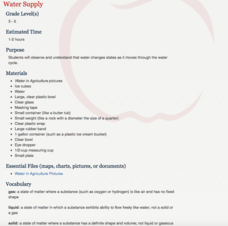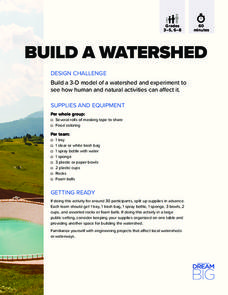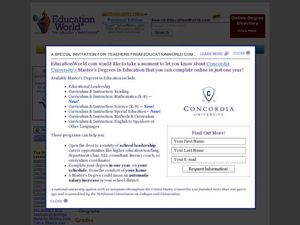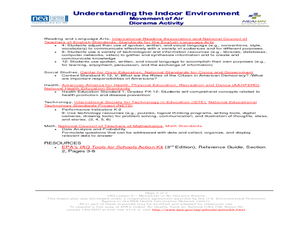University of California
Energy and Biomass Pyramids
Young scientists play tag as they act out the food pyramid in the ocean ecosystem. Energy circles pass from the smaller prey to the predators and at the end of the activity, a data chart and analysis questions allow pupils to apply their...
National Institute of Food and Agriculture
Water Supply
Participate in three activities that look at the earth's limited water supply and the changes water goes through as it enters each phase of the water cycle. The resource is complete with three activities that demonstrate the changing...
Safe Drinking Water Foundation
Water Bottles Everywhere
Young environmentalists examine how water bottle use is polluting the waters on our earth. In groups, your young scholars study the handout on their assigned topic and present their findings to the rest of the class. Leading up to this...
DiscoverE
Build a Watershed
What's the best way to learn how watersheds work? Build one! Combining engineering, the water cycle, and ecology concerns, the activity is the perfect fit for an interdisciplinary unit. Teams construct a model watershed with simple...
National Library of Medicine
Your Environment, Your Health: Runoff, Impervious Surfaces, and Smart Development
Can a sidewalk increase the amount of pollution in local streams? Scholars learn the answer to this question though research and experimentation in the fifth unit in the six-part series. Pupils study runoff, impervious surfaces, and the...
Core Knowledge Foundation
Taking Care of the Earth Tell It Again!™ Read-Aloud Anthology
A read-aloud anthology closely examines human impact on the Earth while boosting reading comprehension skills. Through stories, scholars examine the concepts of natural resources, pollution, garbage, and recycling and brainstorm ways to...
NOAA
Stressed Out!
Are our oceans really suffering due to the choices humans make? The sixth and final installment in the volume of activities challenges research groups to tackle one of six major topics that impact ocean health. After getting to the...
Curated OER
What's Air Got to Do with It?
Learners use M&M's to create a pie graph that expresses their understanding of the composition of air. They watch and conduct several simple experiments to develop an understanding of the properties of air (it has mass, it takes up...
Curated OER
Salt Marsh in a Pan
Students create a model of a salt marsh to discover the impact of pollution and human activities on water-based habitats including bays and the ocean. They recognize the relationship between natural and developed areas. Students impact...
Curated OER
TE Lesson: I've Gotta Get Some Air
Students investigate types and sources of indoor air pollutions both at home and in school. They decide on how to prevent poor indoor air quality. They debate smoking in order to determine how language usage can be an influence in...
Curated OER
The Environment and You
First graders examine the human environmental impact and discover ways to lessen effects. They create a pollution damage flow chart and write down what they think Mother Earth might say. They create inventions from recyclable materials.
Curated OER
Current Groundwater Contamination Research
Students research the effects of groundwater pollutants on life. They name and describe 1 environmental factor that has an effect on our drinking water. Students read the Water-Groundwater and Pollution Article. They discuss and...
Curated OER
Recycle Lifecycle
Young scholars investigate the recycling process. In this recycling lesson, students read the article The Recycling Process After Collection and discuss the advantages of recycling. As an extension activity, young scholars simulate the...
Curated OER
Choices Make A Difference
Students are explained that wastewater treatment plants are regulated as to the quality of water they may discharge into our rivers and canals. They are explained that wastewater treatment plants clean many pollutants out of the...
Curated OER
Strange Winter Weather Affects Nature, People
Students react to a series of statements about the weather, then read a news article about the affect of unusual winter weather on people and animals. In this meteorology and current events lesson, the teacher introduces an article with...
Curated OER
Mini-Unit: Natural Resources
Students explore how their choices affect others. In this character development and ecology lesson, students debate choice-making issues. Students listen to The Lorax by Dr. Seuss and identify choices the characters made about tree...
DiscoverE
Clean It Up
Water, water, everywhere, but not a drop to drink—until we clean it, of course! Scholars design a filtration device that removes pollutants from water. The goal is to have the water come out as clean as possible from the device. How...
Teach Engineering
The Great Pacific Garbage Patch
The Great Pacific Garbage Patch is one of several garbage patches around the world where garbage accumulates naturally. As part of a GIS unit that combines oceanography, environmental science, and life science, class members investigate...
Curated OER
Local Environmental Issues: Pollution
Third graders discuss the ways in which human interaction with the environment and production of waste products contribute to pollution. Through a pollution demonstration, they explain how various groups of plants and animals can be...
Curated OER
Hedgerows
Hedgerows prevent soil erosion, capture pollutants running off fields, store carbon to help combat climate change, and provide homes for predators of many pest species. The biodiversity lesson begins with an activity that discusses why...
National Library of Medicine
Your Environment, Your Health: Chemicals in Your Home
Many people know about chemical pollution, but are all chemicals bad? The third unit in a series of six addresses chemicals common in everyday life. Scholars learn about the chemicals found in their own homes, chemical safety, and...
Curated OER
Movement of Air Diorama Activity
Students make a diorama to illustrate the process of mechanical airflow. In this movement of air lesson, students discuss ventilation and air movement indoors. Students discuss ventilation systems and study pictures of the systems....
Curated OER
Water Pollution Graphing Activity
Young scholars describe and identify the link between land use activities within a watershed and water quality. They evaluate the quality of a "water sample" ( a bag of skittles), graph their results, and form a hypothesis about the land...
Curated OER
Water Pollution Lesson Plan: Don't Trust Your Eyes
Students develop a list of actions they could perform that would protect our water resources from pollution. They formulate hypotheses, conduct experiments and draw conclusions about actual pollutants found in our water supply.

























